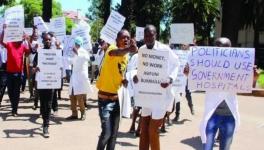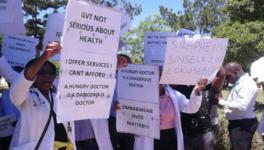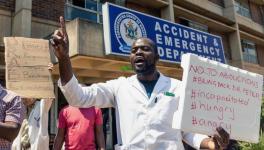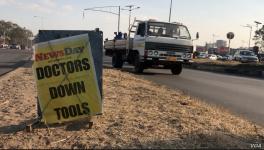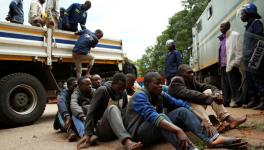After Two Months Without Pay, Senior Doctors in Zimbabwe Join Strike
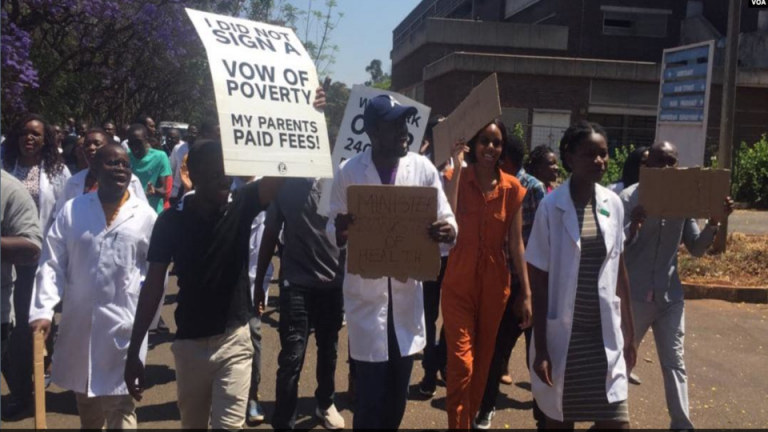
Senior doctors in Zimbabwe demand reinstatement of fired junior doctors.
On November 26, senior doctors in Zimbabwe’s government hospitals, represented by the Senior Hospital Doctors’ Association (SHDA), downed tools citing incapacitation after two months of emergency service for no pay. Junior doctors in the country have stayed away from work since September 3.
It is not clear as to exactly how many senior doctors are on strike. But the severely underfunded public hospitals of Zimbabwe have a total of only 200 such professionals, including specialists.
The senior doctors’ action is on the lines of their juniors who are represented by the Zimbabwe Hospital Doctors Association (ZHDA). The association has reiterated time and again that this is not a strike action per se. They were forced to withdraw their service because the sharp decline in their wages has left them incapable of affording the cost of reporting to work.
Nurses and other allied health professionals are also incapacitated, and have been reporting to work only twice or thrice a week, under pressure from a health ministry directive.
“This creates unbearable pressure on the senior hospital doctors in terms of the workload,” SHDA had complained in a statement on September 30. These doctors had already been struggling to cope with the lack of medicines and medical equipment from as far back as March.
The statement complained about shortage of medicine stock, “particularly in critical areas such as casualty, maternity, neonatal units, high dependency and Intensive Care Units as well as [operation] theaters. Medical equipment and machinery keep breaking down. Diagnostic services, especially laboratory and radiological, are erratic and not in keeping with the requirements for patient care. There are perennial stock-outs of reagents.”
Under such circumstances, “we cannot conscientiously pretend to be offering acceptable and quality healthcare when all that we are doing is to walk with patients to a certain slow death due to a failing health care system,” the senior doctors said.
The average salary of senior doctors is “less than RTGS$500” and “consultants receive a basic salary of RTGS$1010,” the statement added. Payment in this unsound quasi-currency called RTGS was introduced late last year, when the currency was pegged to the USD at a 1:1 ratio.
However, while there has been a continuous slide in the value of this currency vis-a-vis the USD (in accordance with which the prices have been rising), the salaries in RTGS have remained constant.
Currently, RTGS$500 is worth a mere USD 30 and RTGS$1,010 is equal to USD 62. This is according to the official interbank exchange rate at which, as on date, 16.22 RTGS dollars can be exchanged for one USD. However, market rate is varying between 22 to 26 RTGS for one USD.
This low wage they are earning is “barely adequate to fuel up a small vehicle to get the same doctor to and from work.. We are thus incapacitated from continuing to come to work as our remuneration has been eroded by the ever-rising cost of living,” the doctors said.
“It is with a heavy heart we hereby inform you that with effect from.. [October 3] we shall not be able to continue reporting for duty until the causes of our incapacitation have been addressed by you.”
Hospitals a “death trap”
However, the senior doctors had continued offering medical care in the emergency wards.
In the meantime, rather than taking measures to address their incapacitation, the government began intimidation.
The junior doctors were targeted first. Their union’s president, 26-year old Peter Mugombeyi, was abducted by suspected state security agents, and was later hospitalized for treatment upon being released.
When neither the abduction nor the threats of suspension could coerce the junior doctors to report to work, for which they had no means, the government set up a disciplinary committee, which has tried hundreds of them in absentia and found them “guilty of absenting themselves from duty without leave or reasonable cause”.
Over 448 junior doctors have thus been fired, which is over a quarter of the total of 1,601 junior doctors employed in public healthcare. Many more are set to be targeted in these mock trials.
In the meantime, the senior doctors were paid pay no wage at all over the past two months for their service in the emergency wards. This has finally left them incapable of affording the costs of providing even this limited service, and on November 26, they withdrew from work completely.
In a statement on November 27, the SHDA, highlighting the persisting shortages of medicines, “bandages, gloves and syringes,” said that the hospitals have “remained a death trap, even with the presence of the hard-working, highly specialized workforce that Zimbabwe has.”
“This is not about money,” SHDA clarified. “People have been working for years for remuneration well below what they deserve, and in the past 2 months have been working for nothing at all.. We are not slaves. We are not greedy mercenaries. We deserve proper tools of the trade, a living wage and a safe working environment. The citizens of Zimbabwe deserve a health system they can trust.”
Senior doctors have made it clear that they “will not be be re-applying to come back to work”. Reiterating that that “we are not on strike”, the SHDA has said that is does “not accept that one can be dismissed for being incapacitated to come to work in an unsafe environment with nothing to use”.
The union demands the restatement of the junior doctors who have been fired and measures to provide the doctors with the medicines and the equipment needed to care for the patients. Yet again, instead of addressing these demands, the government has started handing disciplinary letters to senior doctors.
“The authorities are so vindictive that they went to [operation] theater to hand a letter to a doctor who was finishing up an emergency operation,” SHDA said. “We are now at a stage where, as in biblical times, Pharaoh has taken away the straw and water and is demanding the same quota of bricks.”
Get the latest reports & analysis with people's perspective on Protests, movements & deep analytical videos, discussions of the current affairs in your Telegram app. Subscribe to NewsClick's Telegram channel & get Real-Time updates on stories, as they get published on our website.










